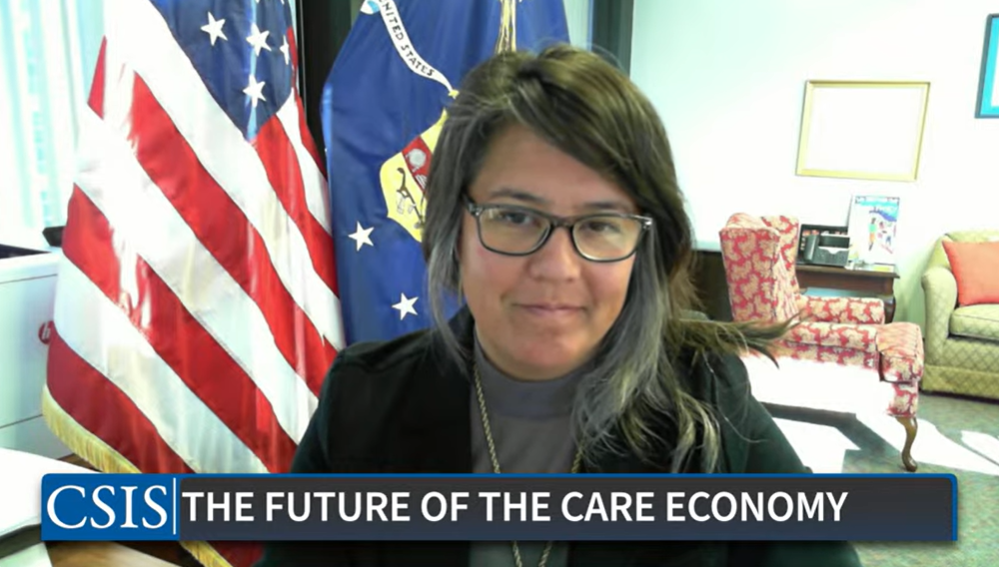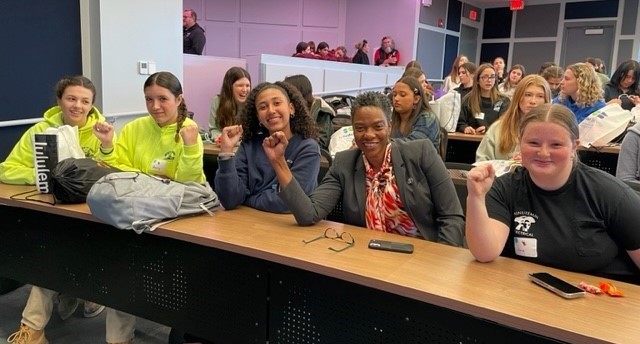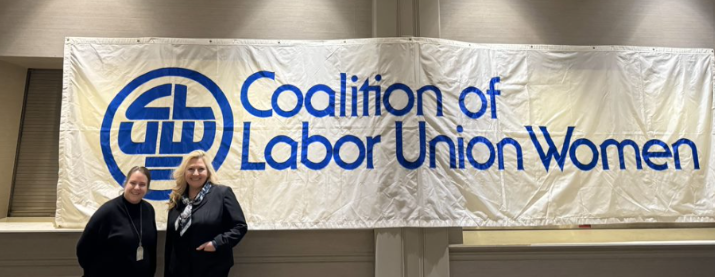
Sample Employment Agreements will help Domestic Workers and Employers Negotiate

Domestic workers keep America's economy and families running, but too often they lack job stability or formal employment arrangements. Our new sample employment agreements for cleaners, home care workers and nannies can help. These sample agreements will put more power into the hands of domestic workers and serve as a helpful starting point to create a shared understanding of the terms of employment between workers and employers. View our new Domestic Workers webpage now and check back frequently as we add translations into other languages.
- Download the sample agreements and explore good practices to consider when drafting an agreement
- Watch Acting Labor Secretary Julie Su announce the sample agreements at CareFest
- Read coverage of the sample agreements in The 19th
Cost of Doing Nothing update shows how much the U.S. is losing out on by not investing in care
We always hear the same question about federal investments in care infrastructure: How much would it cost? In our new fact sheet, the Women’s Bureau updates Department of Labor research from 2015 that turns that question on its head to ask what it's costing us NOT to invest in working families and our care infrastructure the way other peer countries do, through policies like paid sick days, paid family and medical leave, and accessible and affordable child care. The answer is a shocking $775 billion annually!
Military families need paid leave. These states provide it.
Over 1.3 million people serve on active duty in the U.S., with 1.5 million immediate family members serving alongside them. Members of the military and their families may face special caregiving challenges, and a handful of states provide paid family and medical leave for military-adjacent caregiving purposes. Learn which states, and what circumstances they cover, in our new fact sheet.
November Observances
Family Caregivers Month
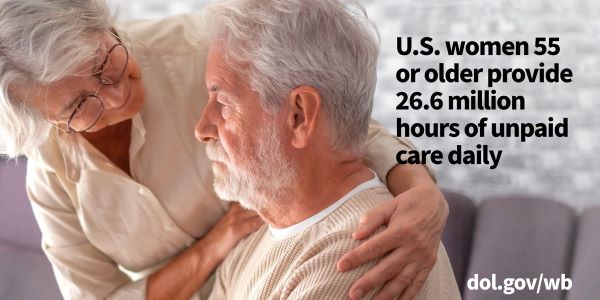
This Family Caregivers Month, our new issue brief highlights an essential pillar of the U.S. care infrastructure: Older women. Not only are older women disproportionately concentrated in many paid caregiving occupations, but they provide crucial unpaid care, as well. In fact, over a year, the average U.S. woman aged 55 or older provides the equivalent of more than five weeks of full-time unpaid care to family members and friends.
- Learn more about older women caregivers
- Read the blog
- Watch our short video
- View all of our resources related to older women and work
National Apprenticeship Week
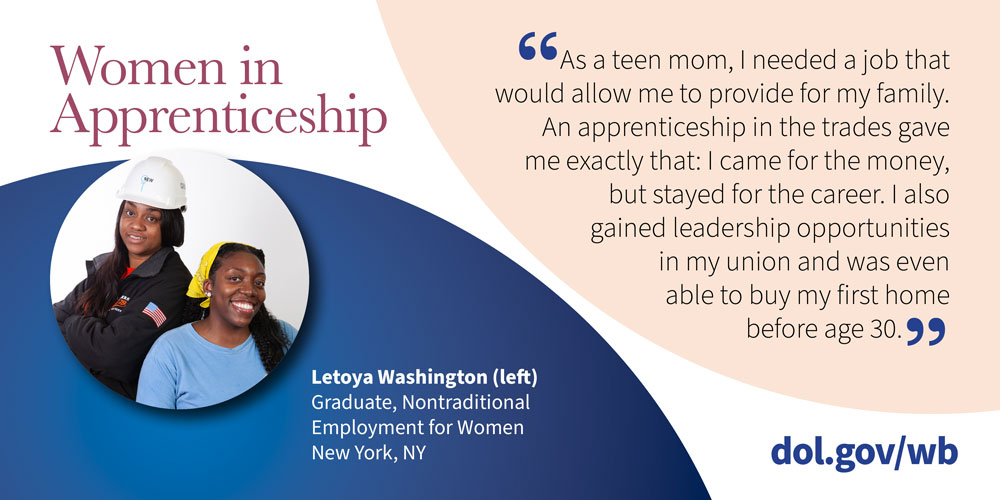
National Apprenticeship Week was a busy one at the Women’s Bureau, as we worked with our sister agencies to showcase apprenticeship as an important strategy toward sustainable career pathways for women. We hosted national and regional webinars laying out the benefits of apprenticeship; profiled women graduates of apprenticeship training programs; published an op-ed about women in apprenticeship and nontraditional fields (see “WB In the News” below); and released a new blog.
- Watch a video highlighting women whose apprenticeships put them on track for career success
- View apprenticeship resources from the WB
- Access apprenticeship resources from the Department of Labor
- Check out our new blog on how historic infrastructure investments can advance equity in the labor force, which was cross-posted on the Department of Commerce’s Internet for All website
Veterans Day
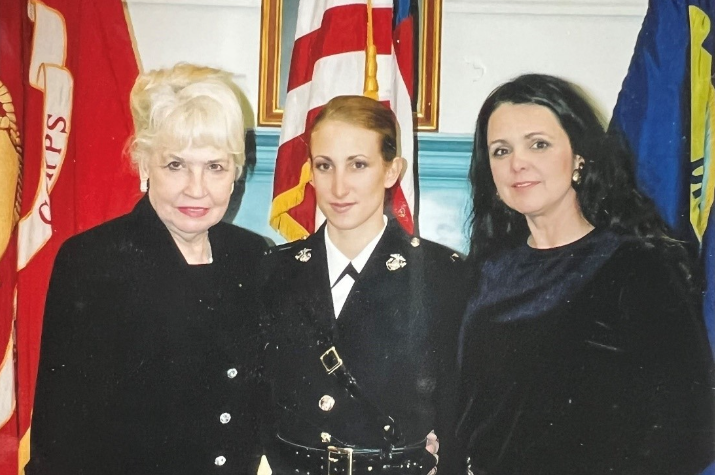
We are grateful to all of America’s veterans, including the veterans – and military spouses – on our staff at the Women’s Bureau, who bring an invaluable perspective to our work.
International Day for the Elimination of Violence Against Women
November 25, the International Day for the Elimination of Violence Against Women, is a reminder that the work of ending gender-based violence and harassment (GBVH), both in the U.S. and globally, is far from finished. November 25 also kicks off the global 16 Days of Activism Against Gender-Based Violence, which stretches through December 10. At the WB, tackling GBVH in the world of work is one of our top priorities.
- Review our microsite on GBVH in the world of work
- Read our recent blog about employment laws that can help survivors of domestic violence at work
- Read our new blog with the Occupational Safety and Health Administration (OSHA) about safety from GBVH at work
- See the Presidential Proclamation
Women's Bureau Receives "Building Together" award from Chicago Women in Trades
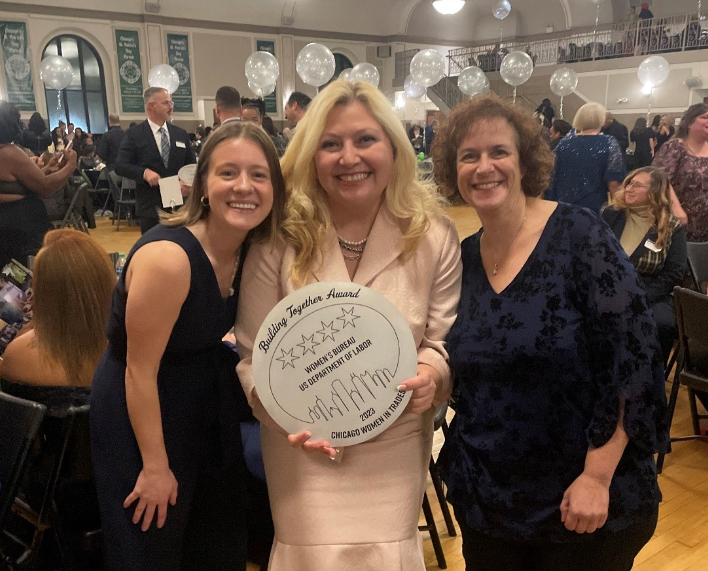
The Women’s Bureau was honored to receive the Building Together award from Chicago Women in Trades (CWIT) for the pivotal role WB has played both in CWIT’s development and, currently, as a thought partner and supporter of CWIT’s work. WB staff led by Midwest Regional Administrator Gina Rodriguez (center) accepted the award at CWIT’s 40th anniversary celebration.
In Case You Missed It
WB Director Wendy Chun-Hoon spoke on a panel organized by the Center for Strategic and International Studies Human Rights Initiative titled “The Future of the Care Economy.” She discussed the WB’s and the Biden-Harris administration’s work to strengthen care infrastructure and support care workers.
Deputy Director Leah Rambo (second from right) spoke at the Massachusetts Girls in Trades conference in Eastern Dorchester, Mass.
Women’s Bureau staff presented on gender-based violence and harassment at the Coalition of Labor Union Women (CLUW) convention in Minneapolis.
WB in the News
- The 19th: Biden administration offers support for nannies, house cleaners, care workers
- NewsNation: Biden admin introduces sample agreements for domestic workers
- Kansas City Star: How can KC fix infrastructure, fill jobs and empower women? One word: Apprenticeships
- Observer-Reporter (Pennsylvania): Rising child care costs forcing some parents to quit or change jobs
We Want to Hear from You!

“Occupational segregation” is the gendered sorting of men and women into different types of jobs. It leads to women being overrepresented in certain jobs, which are valued and compensated less than male-dominated jobs.
We’ve heard from many working women about their experiences with gendered job expectations, the challenges they face at work, the support systems that help them thrive and the policy changes that would help them succeed. We'd like to hear from you.
Follow the Women's Bureau on Twitter: @WB_DOL

The Women’s Bureau has championed the rights of working women and served as a convener of conversations critical to an equitable economy for women for more than 100 years.
Follow us at @WB_DOL to learn more about the latest research, initiatives, policies and updates related to working women and their families.

